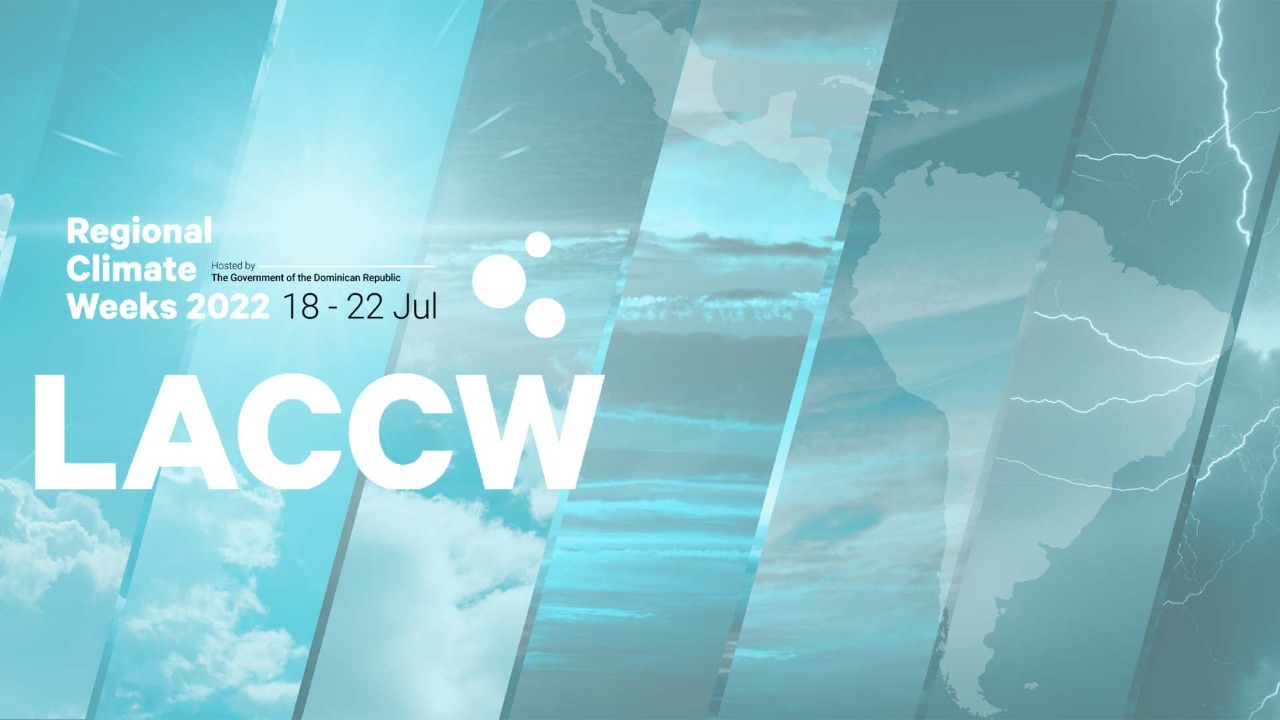ECLAC Participated in Latin America and the Caribbean Climate Week 2022
Work area(s)
The Big Push for Sustainability proposal, the circular economy, the social price of carbon and climate action are some of the issues advanced by the UN regional commission, along with various strategic partners, at the meeting that concluded on Friday, July 22 in the Dominican Republic.

The Big Push for Sustainability proposal, the circular economy, the social price of carbon and climate action are some of the issues that the Economic Commission for Latin America and the Caribbean (ECLAC) advanced during the Latin America and the Caribbean Climate Week 2022, which was held on July 18-22 in Santo Domingo, Dominican Republic.
The event was organized by UN Climate Change in collaboration with the UN Development Program (UNDP), the UN Environment Program (UNEP) and the World Bank Group. ECLAC, the CAF–Development Bank of Latin America and the Inter-American Development Bank (IDB) acted as organizing partners in the region.
The importance of sustainable consumption and production enshrined in the circular economy to achieve the goal of limiting global warming to 1.5°C was the issue addressed during the first gathering, held on Wednesday, July 20 and co-organized by the Government of the Dominican Republic, ECLAC, the United Nations Framework Convention on Climate Change (UNFCCC), UNEP, the Ellen MacArthur Foundation, Brightline Institute, the IDB, ParlAmericas, the Climate Technology Center and Network (CTCN) and Deuman.
At this meeting, entitled Unlocking circular economy opportunities for the target of 1.5 degrees of warming, specialists highlighted the increased awareness of the synergies between the circular economy and climate action seen in the region. In addition, they presented good practices and shared experiences for improving collaboration between the government and stakeholders.
Subsequently, ECLAC, the EUROCLIMA+ program and the Network of National Public Investment Systems of Latin America and the Caribbean (RedSNIP) organized a side event entitled The social price of carbon and public investment evaluation: Applications in the countries of Latin America and the Caribbean.
This session fostered a discussion among national authorities on the use of the social price of carbon in the process of evaluating public investment projects in Latin American and Caribbean countries, and its importance for fulfilling the climate commitments set out in the Nationally Determined Contributions (NDCs).
Meanwhile, in the side event entitled Accelerating implementation of Climate Action Plans in Latin America and the Caribbean, a document was presented detailing the available tools and methodologies focused on strengthening local governments’ Climate Action Plans and facilitating their implementation.
Taking place on July 21 was the Regional Dialogue: Consistency and articulation between NDCs and LTS, an opportunity for coherence in climate policy, organized jointly by UNEP, Deutsche Gesellschaft für Internationale Zusammenarbeit (GIZ), ECLAC and the International and Ibero-American Foundation for Administration and Public Policies (FIIAPP).
With this event, ECLAC, in conjunction with its co-organizers, sought to promote the quest for tools and methodologies that would allow governments to act consistently and coherently in terms of the NDCs and Long-Term Strategies (LTS) in participating countries, with emphasis on adaptation and public investment.
Later, ECLAC presented the Big Push for Sustainability proposal based on a combination of social and environmental policies that – hand in hand with economic, technological and industrial policies – can relaunch a new development project for Latin America and the Caribbean whereby progress on economic goals can be coupled with reducing social and environmental gaps.
At a side event entitled Opportunities for the transition: Towards a big push for sustainability, national authorities and technicians from the region’s countries linked to Planning, Economy and other Ministries exchanged national experiences on the importance of sectors such as renewable energy, electromobility and nature-based solutions for driving a more sustainable recovery for the region.
Finally, ECLAC, GIZ and Costa Rica’s Ministries of Finance and Environment and Energy organized a side event entitled Fiscal Spending and the Role of Finance Ministries in Climate Action: The Experience of Costa Rica, in which participants emphasized the important contribution of fiscal policy for moving towards a greener and more just transition.
Type
Country(ies)
- Latin America and the Caribbean